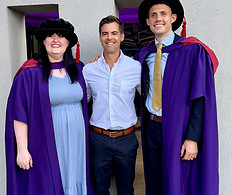
Creating Molecular Probes to Study Interactions in Biology
Welcome to the website of the Butler Research Group. We are based in the Chemistry Department at Loughborough University. Research in the Butler Group is focused on the synthesis of supramolecular tools to probe interactions at the chemistry/biology interface. We are developing fluorescent and luminescent molecular probes for the selective detection of biological substrates. We are applying these probes to monitor biological processes in real-time, such as tracking enzyme activity in vitro and in living cells, to facilitate the discovery of new potent drugs.
Our research is multidisciplinary in nature, spanning organic synthesis, physical organic chemistry techniques, molecular recognition, optical spectroscopy, bioassay development and cellular imaging.
If you are interested in joining the Butler Group please contact Steve for an informal discussion about opportunities, or if you would like to apply for external funding to join the group. We are always looking for keen scientists to join our team!
Latest News
Steric and geometric tuning of Eu(III)-based Anion Receptors

September 2025
Our latest paper in Chem Eur. J. presents four new macrocyclic Eu(III) complexes and demonstrate how ligand structure and positional tuning of π-conjugated antennae modulate steric demand and anion binding site geometry. This enables size and shape complementarity for selective ADP recognition in water over competing phosphoanions.
PhD and MChem Graduation Day

July 2025
We are delighted to congratulate Hannah Pyle and Jamie Webb on their PhD graduations, and Hannah Gurney on completing her MChem degree — fantastic achievements all round!
Congratulations, Prof. Butler!

July 2025
Well done to Steve who was promoted to Professor in Synthetic Supramolecular Chemistry. Much Deserved!
Welcome to Rebecca and Tara

July 2025
Welcome to Tara and Rebecca who join the group to begin their PhDs. We kicked things off with a lunch at the local Priory Pub.
Chathu wins Poster Presentation Prize

June 2025
Congratulations to Chuthu (lead PhD supervisor Amanda Pearce) for winning a poster prize at the 2025 Macro Group YRM meeting in Sheffield.
Rounders! - Farewell to Christy and Hannah
.jpg)
June 2025
The Group enjoyed healthily competitive game of rounders at Ruschcliffe park. Fairwell to Chrsity and Hannah – wishing you all the very best for your next stages of your careers!
Congratulations, Dr Webb!
_edited_edited.jpg)
May 2025
We are delighted to congratulate Jamie on passing his PhD viva with minor corrections! Thanks to Prof. Simon Lewis and Prof. Steve Christie for examining Jamie’s PhD thesis.
2nd Global Action Meeting (GAM) of the LUCES COST Action
_edited.jpg)
May 2025
Tony, Dom and Lea attended and presented at 2nd Global Action Meeting of the LUCES COST action in May 2025. Lea won a first place poster prize, Dom presented his first ever flash talk at an international conference and Tony presented a 15 minute presentation, gaining interest from supervisors intersted in using Array-based systems. Well done, everyone!
Welcome Back, Dom!

January 2025
Welcome back, Dom! Dom is continuing research in the Butler group as a PDRA for the next 3 years on a multi-disciplinary EPSRC project using Ln-containing macrocyclic luminescent probes to detect specific analytes in vapour and liquid.
